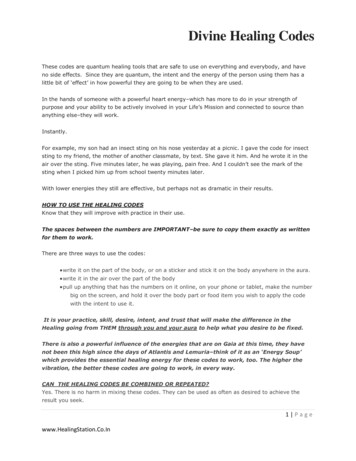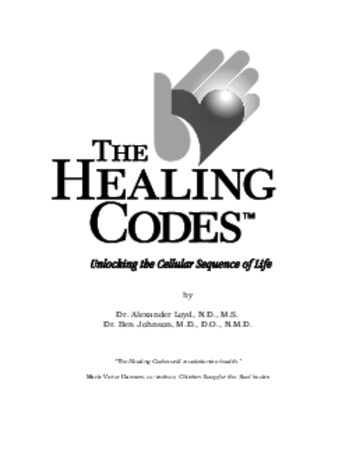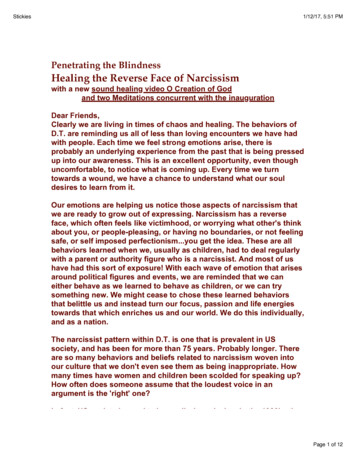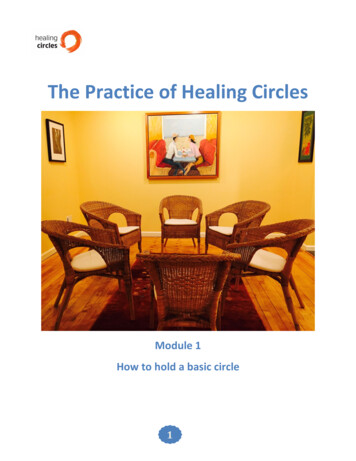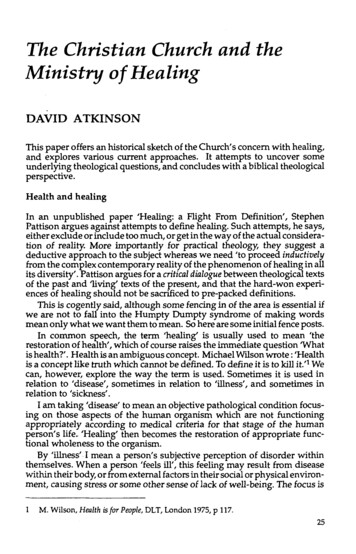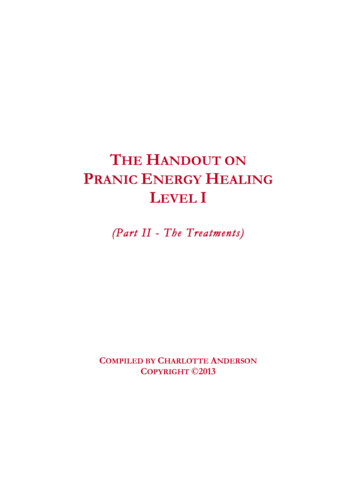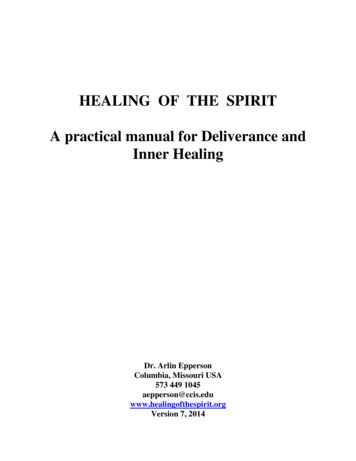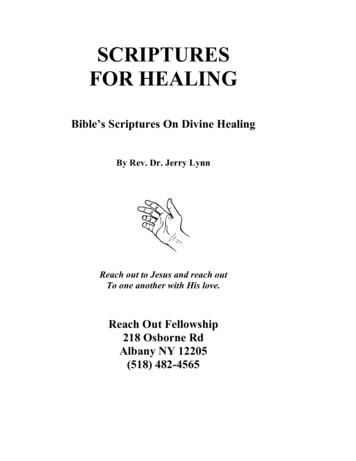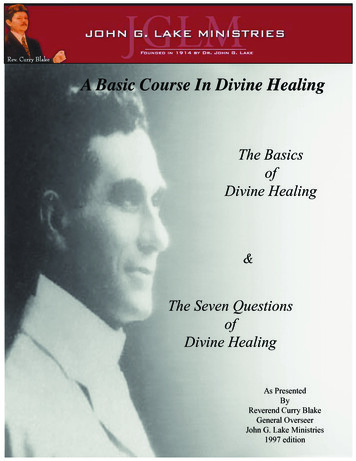
Transcription
1HEALINGJohn EdmistonThis book – Healing is Copyright AIBI-International 1997 – 2010This article may be freely reproduced for non-profit ministry purposes but may not besold in any way and must be reproduced “as is” without alteration. Just e-mail us atjohned@aibi.p
2Table of ContentsThe Baptism and Early Ministry of Jesus3The Healing Ministry of Jesus8Jesus and Healing13The Mercy of God and Healing18Our Bodies Are Temple of the Holy Spirit21Twelve Points On Healing28Common Questions On Healing32Healing, Health and Medicine37Demons Defeated39Bible Verses On Healing48Healing Service Procedure50How to Minister Healing52
3The Baptism and Early Ministry of JesusThen Jesus came from Galilee to John at the Jordan to be baptized by him. {14} And John triedto prevent Him, saying, "I need to be baptized by You, and are You coming to me?" {15} ButJesus answered and said to him, "Permit it to be so now, for thus it is fitting for us to fulfill allrighteousness." Then he allowed Him. {16} When He had been baptized, Jesus came upimmediately from the water; and behold, the heavens were opened to Him, and He saw theSpirit of God descending like a dove and alighting upon Him. {17} And suddenly a voice camefrom heaven, saying, "This is My beloved Son, in whom I am well pleased." (Matthew 3:13-17NKJV)It came to pass in those days that Jesus came from Nazareth of Galilee, and was baptized byJohn in the Jordan. {10} And immediately, coming up from the water, He saw the heavensparting and the Spirit descending upon Him like a dove. {11} Then a voice came from heaven,"You are My beloved Son, in whom I am well pleased." (Mark 1:9-11 NKJV)When all the people were baptized, it came to pass that Jesus also was baptized; and while Heprayed, the heaven was opened. {22} And the Holy Spirit descended in bodily form like a doveupon Him, and a voice came from heaven which said, "You are My beloved Son; in You I amwell pleased." (Luke 3:21-22 NKJV)The next day John saw Jesus coming toward him, and said, "Behold! The Lamb of God whotakes away the sin of the world! {30} "This is He of whom I said, 'After me comes a Man who ispreferred before me, for He was before me.' {31} "I did not know Him; but that He should berevealed to Israel, therefore I came baptizing with water." {32} And John bore witness, saying, "Isaw the Spirit descending from heaven like a dove, and He remained upon Him. {33} "I did notknow Him, but He who sent me to baptize with water said to me, 'Upon whom you see the Spiritdescending, and remaining on Him, this is He who baptizes with the Holy Spirit.' {34} "And Ihave seen and testified that this is the Son of God." (John 1:29-34 NKJV)The Redemptive Qualities of The Baptism of JesusThe baptism of Jesus represents His initiation into Spirit-empowered ministry. Jesus was born ofthe Holy Spirit and indwelt by the Holy Spirit from His mothers womb. This gave Him exceptionalnatural giftings unmarred by sin and a clear mind, filled with exceptional wisdom that couldchallenge the rabbis of His day from an early age. But as wonderful as these gifts were He stillneeded something more if He was to bear the burdens of the world in ministry. His identificationwith sinners at the Jordan and His plunging Himself into the stream of human misery andconflict represent a moving into public life and the bearing of not just His own burdens but theburdens of all the lost.Jesus needed an empowering by the Holy Spirit before He moved out to proclaim the Kingdomof God. This may sound slightly heretical - after all wasn't He God - the fulness of Deity in bodilyform, the incarnate Word full of grace and truth? (Col 2:9, John 1:14-18) Yes!! Absolutely, Hewas, is and always will be God. He did not "become divine" at His baptism or any other time. Hewas the "Lamb slain before the foundation of the world" - He was God before the world beganand was intimately involved in its creation. (John 1:3, Col 1:17). However, as God He "took onthe nature of a Servant" and in this limitedness He was born of a woman, grew up as a child insubmission to His parents and like anyone else entering ministry needed the anointing of theHoly Spirit before He took on the burden of proclaiming the Kingdom, healing the sick, raising
4the dead and suffering for righteousness' sake. In some way he limited Himself to what " aperfect believer " can do. He even said to His disciples that: (John 14:12 NKJV) "Mostassuredly, I say to you, he who believes in Me, the works that I do he will do also; and greaterworks than these he will do, because I go to My Father." Somehow in the economy of God thebeliever ("he who believes in Me") CAN accomplish the works that Christ did on earth ("theworks I do he shall do also") plus a bit extra (and greater works than these he will do because Igo the Father).Now let‟s put that in context - Jesus is talking about the works He did in front of thedisciples,during His earthly ministry but before He went to the cross (the words were utteredduring the last supper). We cannot work the works He did while in heaven - such as Creation.Neither can we take the sins of the world on our shoulders. He has done that and that is Hisglory alone. But in the power of the Holy Spirit which has been given to us since Jesus has goneto the Father we can work the works He did between His baptism and the cross. Don't take myword for it - its Jesus who said it! And the book of Acts certainly reinforces the idea that theSpirit-empowered believer can do great things for God. Now turning this on its head for aminute. if Jesus said "those who believe" could do what He did during His ministry then Hisearthly ministry must have been "limited" to that of the "perfect believer". It is as the "perfectbeliever" that Jesus went and got baptized and it is as the "Spirit-empowered perfect believer"that he went forth in ministry. This leads me to a little theological hypothesis, that the life of the"perfect believer" has two stages. Stage one is that of perfect piety when we fear God and growin wisdom. We become good in ourselves. Stage two is the stage of public proclamation whenwe receive God's power in ministry and our piety and wisdom becomes the foundation for aSpirit-filled life where we become "rivers of living water" to a world in desperate need. I mustvery quickly add that stage two is not "superior" to stage one. Without a foundation in ethics andgoodness ministry can be a dangerous place. Its the wrong place to learn wisdom. No-onedespises a doctor for going to medical school even though he may minister to no-one there. Weunderstand preparation in secular things and we should be prepared to do the preparatory workon our own life. Power without ethics and wisdom is the last thing God wants in your life. Bothstages are necessary if "the perfect believer" is to do and be all that God wants.New Testament Christians were generally baptized immediately upon profession of faith. Theday of their conversion was also the day of their water baptism. So they spoke of the day of theirconversion as "the day of my baptism", not because baptism saves us but because it was theunique external event that occurred on the day they professed faith in Christ. Also, in the revivalconditions of the early church their baptism was often accompanied by the laying on of handsand the impartation of a spiritual gift to the new believer in Spirit baptism. This occasionally wasnot the case.(Acts 18:24-19:7) Apollos was a believer with a great deal of natural speakingability yet still needed to understand the baptism in the Spirit if he was to proclaim the gospel"accurately". Also some believers who knew only the "baptism of John" and had not "even heardthat there was a Holy Spirit". This is not unusual even today as some Christians receive verylittle teaching due to isolation, misunderstanding or inadequate ministry. Ideally all three aspectsof baptism belong together. But they have wandered apart. We have people who are baptizedbut not changed. We have converts who have never had water baptism. And we have strongChristians who have not received the empowering ministry of the Holy Spirit.We need to press on and to desire to be Spirit-filled proclaimers of God's Kingdom. If we are tomove beyond this accumulation of wisdom and truly minister to others in an effective way weneed a "baptism in the Holy Spirit". This simply means we need an all-encompassing immersionin the God-head that empowers us for ministry. Baptism in the Spirit is not a private thing and itdoesn't belong to any one denomination. It is not always accompanied by speaking in tonguesor prophesy. Jesus' baptism had neither. The miracles came after the baptism. This baptism is
5an initiation not just into the church but into the power of the Kingdom. This baptism is whathappened to Jesus as he moved from an obscure life to center stage. It happened to thedisciples at Pentecost who finally got plunged into full revival ministry themselves. And ithappened to Wesley and countless other leaders of the Christian faith. The Jordan is a placewhere we get the power to stand in the flood of human souls and minister Christ to them.The "baptism in the Spirit" is real, powerful and moves us out of our private pietism into publicproclamation of the Kingdom of God. For me this happened unsought when God confronted mewith the utter self-centeredness of my faith. I saw that I needed to cleanse out the filthy blackmess of sin that remained in my life. It was an encounter with the awfulness of selfishness. Itwas evident that I had no hope apart from what Christ could do in me and with me. This was nota conversion, it was a dealing with the sin that entangled me, I was set free to run the race and Idid. I led a huge number of people to God in the ensuing weeks. I was on fire with God becauseI had met Him in power. It was Jacob at Bethel all over again. This encounter with God, this"deeper experience" was not ecstatic - except that in the middle of it I did have a vision of mysin and of God. It took my faith from the private realm to the public realm; from self-edification tospirit-filled ministry; from a complaining Christian to a proclaiming herald.Jesus did not have all this selfish sin to deal with, but He did need the power that God wouldprovide in response to humble obedience. And He identified with sinners and "went down thefront" with all the people being ministered to. I still struggle with "going down the front", how canI, a Christian leader, admit that I too have needs. I should "be an example" a stainless steel"there's nothing wrong with me" Christian. There is a real live Pharisee in me just waiting to getout. Its hypocritical to say I don't need ministry, that somehow my faith puts me a cut above theordinary Christian. I do need ministry - lots of it. I go down the front now perhaps more thanever. It still hurts to do it. But Jesus wandered out there and said He was in need of God. Hesaid that "it was fitting to fulfill all righteousness". Many preachers have felt like John the Baptistwhen they give an appeal and some real saint of God comes down the front and wants prayer tobe a better Christian. I think "I need ministry from you, not you from me." but the saints attitudeis "this is fitting." It‟s a humble person who can accept ministry from someone who is "unworthyto untie the thongs of their sandals".A few quick correctives - the "baptism in the Holy Spirit" that we speak of here is NOT the sameas the initial indwelling. All believers are indwelt with the Holy Spirit from the moment of their"new birth" just as Jesus was indwelt with the Holy Spirit from conception. Perhaps a better termwould be "the empowering of the Holy Spirit", it is certainly less confusing. Three things areunited in one term in the New Testament - water baptism, conversion and Spirit baptism. AtPentecost they all seemed to occur together. Water baptism is associated with repentance fromsin and the appeal to God for a good conscience (1 Peter 3:21,22 Acts 2:38). Conversionrepresents the change of being old man to new man that comes as God re-creates the sinnerinto a "saint" (holy one, believer) (Eph 5:8,9; Col 1:13,14)."Spirit baptism" involves being empowered to take up our place in the body of Christ in theexercise of whatever spiritual gifts have been imparted to us. (1 Cor 12:13) Just as it is badmanners to see a person as a lesser Christian if they have not had water baptism so it is notgracious to categorize people as "spirit-filled" and "un-spirit-filled". Such distinctions are divisive.Certainly to do as Priscilla and Aquila did and take someone aside and explain the way of Godmore accurately (and in love) is fine and helpful. However, I sense a certain spiritual pride insome believers in spirit baptism that leads me to urge caution in the way we approach the issue.Also there is no hint in the New Testament that "tarrying", seeking, or any prolonged anguish isnecessary as preparation. It is not some exalted spiritual but a frequently misunderstood part of
6the gospel along with water baptism and conversion. It is for all believers and like everythingelse is received by faith in the proclaimed word of Christ.The Early MinistryThe early ministry of Christ is an outworking and authentication of His baptismal experience. Iwill deal with the temptations separately next month but here in His early ministry he comesprimarily as the anointed one with the power to resist evil and to bring in the Kingdom of God inpower.(Matthew 4:13-25 NKJV). And leaving Nazareth, He came and dwelt in Capernaum, which is bythe sea, in the regions of Zebulun and Naphtali, {14} that it might be fulfilled which was spokenby Isaiah the prophet, saying: {15} "The land of Zebulun and the land of Naphtali, By the way ofthe sea, beyond the Jordan, Galilee of the Gentiles: {16} The people who sat in darkness haveseen a great light, And upon those who sat in the region and shadow of death Light hasdawned." {17} From that time Jesus began to preach and to say, "Repent, for the kingdom ofheaven is at hand." {18} And Jesus, walking by the Sea of Galilee, saw two brothers, Simoncalled Peter, and Andrew his brother, casting a net into the sea; for they were fishermen. {19}Then He said to them, "Follow Me, and I will make you fishers of men." {20} They immediatelyleft their nets and followed Him. {21} Going on from there, He saw two other brothers, Jamesthe son of Zebedee, and John his brother, in the boat with Zebedee their father, mending theirnets. He called them, {22} and immediately they left the boat and their father, and followed Him.{23} And Jesus went about all Galilee, teaching in their synagogues, preaching the gospel of thekingdom, and healing all kinds of sickness and all kinds of disease among the people. {24} ThenHis fame went throughout all Syria; and they brought to Him all sick people who were afflictedwith various diseases and torments, and those who were demon-possessed, epileptics, andparalytics; and He healed them. {25} Great multitudes followed Him; from Galilee, and fromDecapolis, Jerusalem, Judea, and beyond the Jordan.The anointing received at his baptism leads Him into a widespread ministry of proclamation.Matt 4:23a "And Jesus went about all Galilee, teaching in their synagogues, preaching thegospel of the kingdom,". From Galilee in north of Israel the word went out and many peoplewere attracted to the "great light" (Matt 4:16). His fame caused people to travel hundreds ofmiles to see Him, people came from Syria in the north, Jerusalem in the south and from beyonthe Jordan to the west. People came from the Greek speaking Decapolis and the Hebrewspeaking Judea. Like moths to a flame multitudes were drawn to the ministry of Jesus. Theanointing has "drawing power".Secondly, the baptism of the Spirit produces a public and obvious concern with holiness. Notthat Jesus was unconcerned with holiness before! But now it is out in the open - His message is"Repent for the Kingdom of God is at hand.". This holiness is also reflected in a calling of othersinto ministry to lead lives separated from worldly concerns in the pursuit of the Kingdom. Simonand Andrew are called by Jesus not to be "nice people" but to be "fishers of men", to beapostles of a new Kingdom not just improved worldlings. The baptism in the Spirit imparts thateternal perspective that makes the Kingdom the only thing that really matters.Thirdly, the anointing has power to heal - after His baptism He healed "all kinds of sickness andall kinds of disease.". Before His baptism not a single healing is recorded. After it He puts thephysicians out of business. All who came to Him were healed not by His diagnostic ability or Hisknowledge of herbs but by the power that flowed from Him that He received when the Spiritcame upon Him. If we desire to heal others in body or in soul we will end up struggling to heal a
7handful by our own strength but we may heal thousands if God so chooses to impart His Spiritof healing in power upon us.The final authentication of His baptism in the Spirit is the possession of extraordinary spiritualauthority over the powers of darkness. This was, of course latent in Jesus from the beginningbut it became obvious to all when His public ministry began and He moved in the continualpower of the anointing of God. After Pentecost the apostles moved in this same power to healthe sick and to exorcise demons. These abilities are "graces" - no ordinary mortal by their ownknowledge can heal the sick with a word or cast out a demon by their own authority. And theycertainly cannot do it on the scale that Jesus or the apostles did it. And on Jesus authority wecan know that we who believe can "do these works" and "even greater works" not because weare special but because Christ has gone to the Father. Because of this the Holy Spirit - who isGod and who can do these things, has been poured out upon us. Jesus early ministry clearlyshows that our effectiveness is not of ourselves but lies entirely in the power of God.SummaryThe "baptism in the Holy Spirit" as experienced by Jesus resulted in :(1)The proclamation of the gospel of the Kingdom.(2) An attractiveness to others that draws people widely to hear God's message, this is notnatural attractiveness (of which Jesus apparently had very little) but a suernatural blessednessthat draws people in like moths to a flame.(3) A concern with holiness that calls others to lead a repentant and separated lifestyle.(4) Healing of the sick that is way beyond normal expectations in its scope. This wide scope isboth in the numbers healed and in the great range of maladies that are cured -including"incurable" conditions such as epilepsy and paralysis. (Matt 4:24)(5) Authority over the powers of darkness.These five things are among the works of Jesus that we can replicate and even exceed (John14:12) though few have done so or gone anywhere near it. They are the marks of an authenticbaptism of the Spirit. They are the fruit produced by an empowered and prepared believerwhose character is without fault. Next month we will take up the relationship between testedcharacter and spiritual empowerment when we look at the temptation in the wilderness - thesubject of Milton's "Paradise Regained".Prayer“Lord, so work in me that I may be a fit vessel for your empowering. I acknowledge that anyresults I may see are because You indwell me or anoint me. I place myself before You and inobedience ask for an empowering of the Spirit suited for this hour and this time and for themission you have called me to. Proclaim Your Kingdom through me in holiness and in Truth.May I testify to your Kingdom through healing and deliverance. May I set You forth so clearlythat many flock to find You. Amen.”
8The Healing Ministry of JesusThe healing ministry of Jesus is one of the most acknowledged and most controversial parts ofHis redemptive work. There are those who see healing as being "in the cross" and thusautomatically and instantly available to the believer. Others see physical healing as outside ofredemption which they confine to dealing with sin. Both views are, to my mind, a little less thanfully biblical. Jesus did indeed bear our illnesses - but not first of all on the cross, but during Hisearthly ministry to the sick. Matthew clearly sees the fulfillment of the prophecy being whileJesus was alive and ministering!When evening had come, they brought to Him many who were demon-possessed. AndHe cast out the spirits with a word, and healed all who were sick, {17} that it might befulfilled which was spoken by Isaiah the prophet, saying: "He Himself took our infirmitiesAnd bore our sicknesses." (Matthew 8:16-17 NKJV)However, that fact that Jesus has ceased His earthly ministry does not mean that He hasceased His healing ministry because healing is part of the nature and goodness of God and thatdoes not change. The ministry of healing is as unchanged as Christ Himself.Jesus Christ is the same yesterday, today, and forever. (Hebrews 13:8 NKJV)The healing ministry of Jesus can be broken into two parts:That which He did before the cross and which He taught His disciples to do (Matthew 10:8, Luke10:1,9, Acts 5:16) and which we can participate in by faith today (John 14:12, James 5:13-15)That which He did in the cross itself. This is a unique and completed work and we simplyproclaim its benefits. This is the healing of our spirits from sin , death and going astray. (1 Peter2:24,25).I will deal with the second part in a later part of this series on redemption. For now I willconcentrate on physical healing, exorcism and raising the dead as typified by Jesus earthlyministry before the Cross and which He continues today through His servants. (Acts 4:22, 30;5:16; James 5:13-15)Physical healingEven among unbelievers there is a general perception of Jesus as a healer of the sick. It isclosely entwined with who He is and how He acts towards needy people. People see Jesus assomeone who is supposed to meet their deepest needs including the need for physical healing.When people see healing take place in Jesus' name it strengthens their faith in His nature andin the gospels thus enabling many to believe for salvation. Healing the sick and preaching wereoften associated in Jesus' ministry. But to confine healing to something that validates the gospelis to miss Christ's compassion for the sick and to turn healing into little more than an attentiongaining religious publicity stunt. Jesus was genuinely moved out of compassion for the sick. ForHim healing was an essential part of His ministry to hurting people and not merely an "opener"before the message. Jesus associated healing with the Presence of His Kingdom (Luke 10:9).The Kingdom has not yet arrived and still needs to be proclaimed with power and authority.Jesus through His body the Church needs to confront evil in all its forms - physical, emotional,spiritual and systemic. Thus we can expect His healing ministry to be manifested today to somedegree in the redemption of our physical bodies from the effects of evil. This will be finally
9accomplished at the resurrection but is accomplished in part and as a foretaste through Hishealing ministry today. So we see that Jesus is still the same yesterday, today and forever andis still healing the sick. Each day thousands of people around the world experience healing inanswer to prayer. Sure not all are healed, sure a lot more should/could be healed, but theChurch is reawakening to the Presence of Jesus in our midst as our healing Redeemer. Thefollowing six points provide a brief theological tour of the reasons underlying Jesus' healingministry. I am sure you can diligently search the Scriptures to find even more!As the incarnation of God. One of the names of God is YHWH Rapha "The Lord Your Healer".Our God has always been a healing God and this is His nature. Therefore Jesus as incarnatedeity represented this by healing the sick. (Exodus 15:26 NKJV) and said, "If you diligentlyheed the voice of the LORD your God and do what is right in His sight, give ear to Hiscommandments and keep all His statutes, I will put none of the diseases on you which Ihave brought on the Egyptians. For I am the LORD who heals you.As an intercessor against evil and bearer of sin. Jesus confronted all forms of evil andlifted it off people. (This is perhaps a more literal translation to bear). As the Confronterand demolisher of evil He took on sickness and the toll it takes on suffering humanity. (1John 3:8 NKJV) He who sins is of the devil, for the devil has sinned from the beginning. For thispurpose the Son of God was manifested, that He might destroy the works of the devil. [See alsoMatt 8:16,17, Isaiah 53:4,5]As One who did "the Father's will" and only did what He saw the Father doing He enactedGod's "Father-heart" toward His Creation. If as human fathers we want our children wellhow much more does God want His images healed - both physically and spiritually?(John 5:19-21 NKJV) Then Jesus answered and said to them, "Most assuredly, I say to you, theSon can do nothing of Himself, but what He sees the Father do; for whatever He does, the Sonalso does in like manner. {20} "For the Father loves the Son, and shows Him all things that HeHimself does; and He will show Him greater works than these, that you may marvel. {21} "For asthe Father raises the dead and gives life to them, even so the Son gives life to whom He will.[See also Luke 11:10-13] Note: These verses tell us that all His works flowed from anintimate relationship of obedience to the Father so that Jesus knew His actual will in allthings. This was not some quick presumption of what His will "should be" (like we tendto do) and knowing the Fathers will from an intimate relationship with Him is perhaps oneof the keys to healing people today.Out of mercy - God's relenting in judgment on sinners - and consequent bestowing of blessing.The blind men cried "Have mercy on us Son of David." and were healed. Many of Jesus'miracles flowed from His compassion for hurting humanity.As a fulfillment of Old Testament prophecy and His nature as the Messiah. For instancein Malachi it says: (Malachi 4:2 NKJV) But to you who fear My name The Sun ofRighteousness shall arise With healing in His wings; And you shall go out And grow fat like stallfed calves.As a demonstration of the Spirit's power and the Presence of the Kingdom of God. (Luke10:9 NKJV) "And heal the sick there, and say to them, 'The kingdom of God has come near toyou.'
10ExorcismThen one was brought to Him who was demon-possessed, blind and mute; and He healed him,so that the blind and mute man both spoke and saw. {23} And all the multitudes were amazedand said, "Could this be the Son of David?" {24} Now when the Pharisees heard it they said,"This fellow does not cast out demons except by Beelzebub, the ruler of the demons." {25} ButJesus knew their thoughts, and said to them: "Every kingdom divided against itself is brought todesolation, and every city or house divided against itself will not stand. {26} "If Satan casts outSatan, he is divided against himself. How then will his kingdom stand? {27} "And if I cast outdemons by Beelzebub, by whom do your sons cast them out? Therefore they shall be yourjudges. {28} "But if I cast out demons by the Spirit of God, surely the kingdom of God has comeupon you. {29} "Or how can one enter a strong man's house and plunder his goods, unless hefirst binds the strong man? And then he will plunder his house. (Matthew 12:22-29 NKJV)There is increasing recognition today of an evil spiritual kingdom arrayed against theKingdom of God. Movies such as "The Exorcist" and "The Omen" and sensationalizedreports of exorcisms gone wrong have done little to help the Church. They have insteadcreated a paralyzing fear of tackling the demonic realm. Yet for Jesus His authority overthe demonic realm was undisputed and absolute. He cast out demons with a word(Matthew 8:16; Mark 1:27) and relieved the symptoms of their possession (Luke 13:1113). He also passed this authority to the Twelve and later to the 70. (Luke 10:17-22 NKJV)Then the seventy returned with joy, saying, "Lord, even the demons are subject to us in Yourname." {18} And He said to them, "I saw Satan fall like lightning from heaven. {19} "Behold, Igive you the authority to trample on serpents and scorpions, and over all the power of theenemy, and nothing shall by any means hurt you. {20} "Nevertheless do not rejoice in this, thatthe spirits are subject to you, but rather rejoice because your names are written in heaven." {21}In that hour Jesus rejoiced in the Spirit and said, "I thank You, Father, Lord of heaven and earth,that You have hidden these things from the wise and prudent and revealed them to babes. Evenso, Father, for so it seemed good in Your sight. {22} "All things have been delivered to Me by MyFather, and no one knows who the Son is except the Father, and who the Father is except theSon, and the one to whom the Son wills to reveal Him."This is a great perspective statement. It puts authority over spirits in the second rank ofblessings behind those associated with salvation (v. 20). Yet it clearly states that even "babes" the ordinary Christians who are neither "wise" or "prudent"(v. 21) can operate in spiritual powerand authority providing they operate within the scope of Jesus' redeeming Name (v. 17-19).Demons do not respect knowledge. They only respect authority and power. God gives Hisauthority and power to all who believe and operate in his name. The humblest believer can beendowed with great authority from God. The apostles were certainly "unschooled" miracleworkers (Acts 4:13,14).The power to deal with the demonic comes from God through faith in the name of Jesusand is part of His works that He trained His Church to do (Matt 10:8). The Presence of theKingdom demands the absence of the demonic and evicting evil powers is a batt
The Healing Ministry of Jesus 8 Jesus and Healing 13 The Mercy of God and Healing 18 Our Bodies Are Temple of the Holy Spirit 21 Twelve Points On Healing 28 Common Questions On Healing 32 Healing, Health and Medicine 37 Demons Defeated 39 Bible Verses On Healing 48 .


